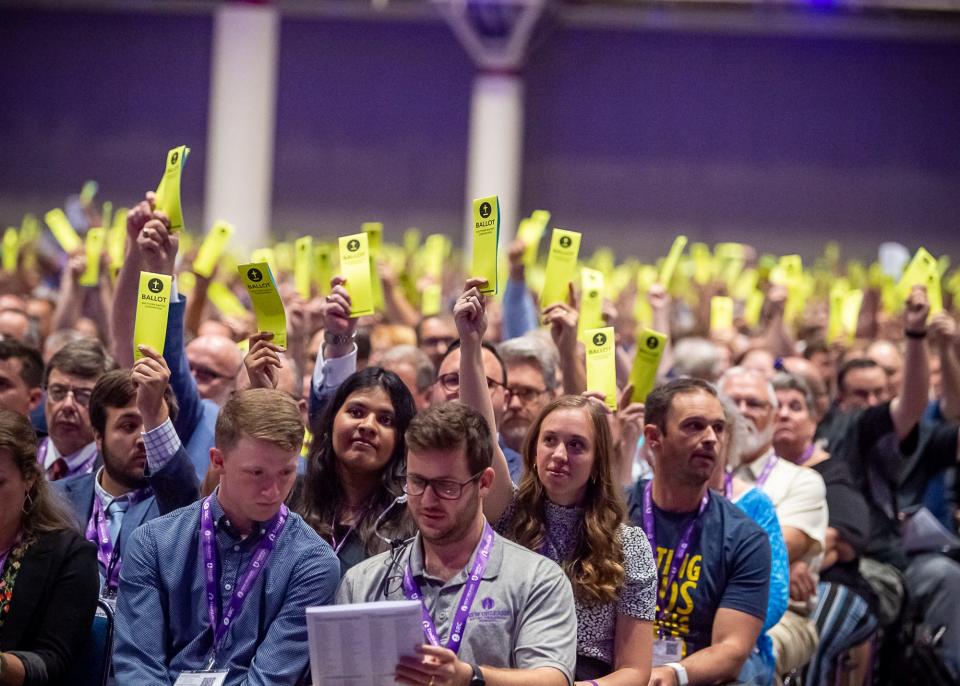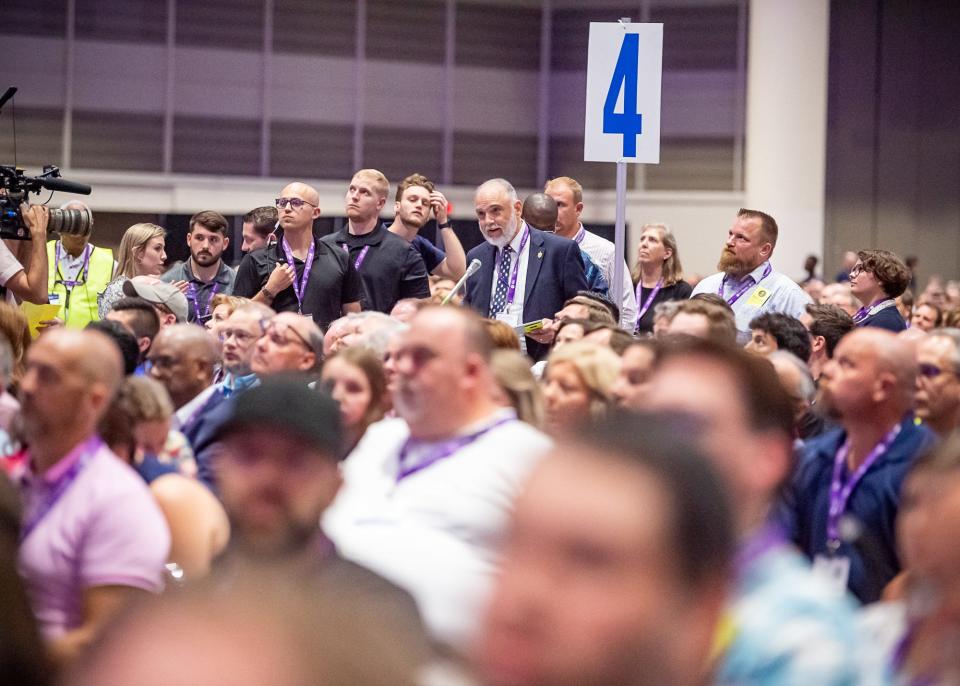Amid hurdles to reform for SBC, how state leaders are elevating the conversation on abuse
Inspired by a third-party abuse investigation into the Southern Baptist Convention’s past, Missouri pastor Mike Leake sought a similar inquiry into his state convention in 2021.
Leake was new to advocating for abuse reform at the time, and he was ultimately unsuccessful in his push for a state-level abuse inquiry. But the moment taught him about the pushback he'll encounter while speaking up about this issue, despite many Southern Baptists professed opposition to abuse.
“We want to be seen as caring about survivors, but a lot of times we’re not willing to do what actually needs to be done,” Leake said in an interview. “Because that’s hard.”
Leake’s persistence eventually landed him on an abuse response team that Missouri Baptist Convention leaders formed. In October, that abuse response team presented its completed work to the state convention at its annual meeting, including a 32-page report, seven-page booklet and two resolutions.
At other meetings in October and November, at least seven other state conventions — Colorado, Mississippi, Arkansas, Maryland/Delaware, Virginia, Alabama, and South Carolina — unveiled new tools and guidelines for churches on how to prevent and respond to abuse.
The Nashville-based SBC is the nation's largest Protestant denomination and abuse reform across state conventions has received less attention than efforts at the national level, such as the SBC Abuse Reform Implementation Task Force. But the state conventions have allowed more people to take initiative, further the conversation on the prevalence of abuse, and often more effectively implement reform.
The SBC Abuse Reform Implementation Task Force is in its second year of work as part of an ongoing response to consultant Guidepost Solutions’ May 2022 report with findings from its investigation into SBC leaders' handling of the abuse crisis. During that time, about half of the total state conventions formed staff or volunteer-led teams in 2021 and 2022 to address abuse.

“I think the state level is really where we’re going to see change,” said Kris Buckman, a member of the SBC Abuse Reform Implementation Task Force and a children’s & youth ministry consultant for the Baptist Convention of Maryland/Delaware.
Buckman has seen how the national and state level efforts can help one another. She helped her state convention create a five-step self-assessment for churches, inspiring a similar resource published by the SBC Abuse Reform Implementation Task Force. This past year, the Maryland/Delaware convention facilitated workshops from which the national task force plans to publish video recordings as a resource nationwide.
But there are also different needs at the national level versus that of the state. The SBC’s non-hierarchical structure, rooted in a commitment to local church autonomy, creates the need for Southern Baptists to act at the local level. The SBC is organized from the bottom-up — from the local church, to regional associations, then state conventions to the national convention — with each level independent of each other.
National leaders “can offer guidance on the broader things,” Buckman said. “(But) culture change in this area comes from the bottom-up, not the top-down.”
Recent SBC abuse-related controversy: SBC legal brief sparks crisis of confidence in denomination over abuse response
'Not waiting'
The SBC once led the way over state conventions in abuse response with Guidepost’s investigation two years ago, but the pace of progress has switched lately.
Factionalism in the denomination nationally has fueled pushback to abuse reform and diverted attention to other priorities, such as a debate over women pastors. The political tumultuousness is added stress for the SBC Abuse Reform Implementation Task Force as it sorts through complicated legal questions ahead of releasing an early version of Ministry Check, a database of ministers credibly accused of abuse.

“I understand that it is slow work in SBC life," Leake said. "But I think there are some issues we seem to move a lot faster for.”
Yet Leake and others have found the rollout of abuse reform at the state level moving quicker.
At state convention meetings in October and November, abuse response teams in Colorado, Mississippi, Arkansas, and Alabama presented new, detailed resource hubs. That includes websites, and in Mississippi, a 44-page booklet that includes a sample application for screening candidates for ministry staff, and in Colorado a 40-page guide. Missouri’s team created a flow chart to guide churches in responding to abuse.
The Maryland/Delaware convention fully passed a constitutional amendment enshrining a commitment to combating abuse. The measure enables the state convention to disfellowship churches that mishandle abuse and refuse corrective action. State convention leaders in South Carolina announced a plan to employ a contractor to serve as a full-time sexual abuse adviser.
“We are not waiting for something to come down to us,” Christa Neal, who chaired the Arkansas convention’s abuse response team, said in an interview. “We know what we should be doing at the state level.”
Neal, now the Title IX coordinator at Ouachita Baptist University and previously the founding executive director of a children’s advocacy center, served on the Arkansas team with pastors, a retired prosecutor, and a social worker.
“If you don’t have people there that truly come at it from a trauma lens and understand what it’s like to be a victim, you can’t just know that naturally,” Neal said. “You need someone who is trained in it.”
On her own accord, Neal developed a training for Southern Baptist associations (leaders of a smaller region within a state). Neal’s abuse response team with the state convention plans to expand that training in the next year.
Similarly, Craig Carlisle, who chaired the abuse response team in Alabama and is on staff at a Southern Baptist association, organized a symposium for churches in his county featuring community experts.
Carlisle is helping other associations organize similar events, with the goal of reaching more small churches. Smaller congregations, which comprise the bulk of total Southern Baptist churches, with limited resources might be disincentivized from investing in certain reform, while the small-town feel is sometimes a mental block.
“I urge you: don’t think this won’t happen in your church,” Mississippi pastor Brad Eubank, an abuse survivor who chairs his state convention's abuse response team and a member of the SBC Abuse Reform Implementation Task Force, said in a presentation to his state convention last month. “Please don’t think you know everyone in your church and therefore it could not happen in your church.”
Aside from the technical benefits, more localized abuse reform has been instrumental in furthering and elevating the conversation about the crisis. Otherwise, Southern Baptists would be exposed to a brief presentation at the SBC annual meeting and occasional news releases from the SBC Abuse Reform Implementation Task Force.
Carlisle, also a member of the SBC Executive Committee, an administrative group at the national level, even questions how many small churches pay attention to those news releases.
“At the higher levels, you can only do so much. I think your connection is limited,” Carlisle said. “If we don’t localize this, my concern is it’s going to get lost.”
Other recent SBC news: What state-level ousters of SBC churches say about the national debate about women pastors
Liam Adams covers religion for The Tennessean. Reach him at ladams@tennessean.com or on social media @liamsadams.
This article originally appeared on Nashville Tennessean: In SBC, Southern Baptists step up at state level to enact abuse reform

